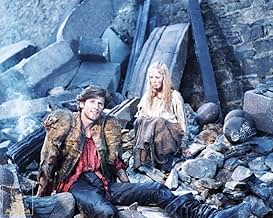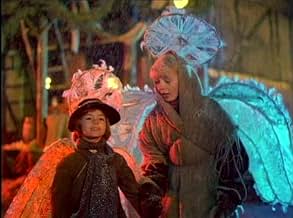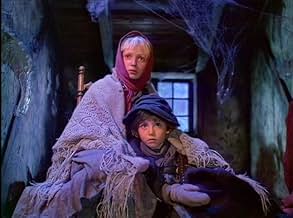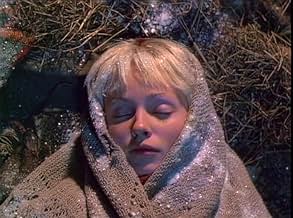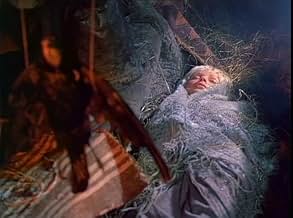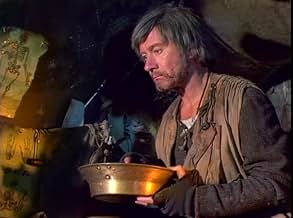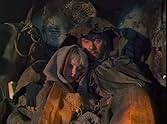Skazka stranstviy
- 1983
- 1h 41min
CALIFICACIÓN DE IMDb
7.7/10
1.2 k
TU CALIFICACIÓN
Agrega una trama en tu idiomaIn a medieval fantasy kingdom, two orphans, May and his sister Martha, live in poverty. A group of robbers kidnap May to use his magic talent: he feels sick when surrounded by gold, therefor... Leer todoIn a medieval fantasy kingdom, two orphans, May and his sister Martha, live in poverty. A group of robbers kidnap May to use his magic talent: he feels sick when surrounded by gold, therefore he can feel gold from a long distance.In a medieval fantasy kingdom, two orphans, May and his sister Martha, live in poverty. A group of robbers kidnap May to use his magic talent: he feels sick when surrounded by gold, therefore he can feel gold from a long distance.
- Dirección
- Guionistas
- Elenco
Kseniya Piryatinskaya
- May
- (as Ksyusha Piryatinskaya)
Baltybay Seytmatov
- Second robber
- (as B.Seitmamutov)
Valeriy Storozhik
- May (after 10 yrs.)
- (as V.Storozhik)
Carmen Galin
- Plague
- (as K.Galin)
Venyamin Smekhov
- Don Quixote
- (as V.Smekhov)
Aleksandr Pyatkov
- Driller
- (as A.Pyatkov)
Octavian Cotescu
- Judge
- (as O.Kotesku)
Jean Lorin Florescu
- Prosecutor
- (as Zh.L.Floresku)
Vladimir Basov
- Barrister
- (as V.Basov)
- Dirección
- Guionistas
- Todo el elenco y el equipo
- Producción, taquilla y más en IMDbPro
Opiniones destacadas
This movie is supposed to be a fairytale. Is not. I saw it some years ago and I tell you: it's really dark, dark fantasy. The plague, personalized as a female beggar or beautiful lady brought me several nightmares. Well, this movie is really good! But don't allow your children watch it!
10snoducky
Still holds up to this day.
This movie creates a magical atmosphere incredibly well using music, landscapes and acting to create something unique for that time. The film shows how experiences shape people to the better or worse, in this case it is Schoenberg through the change from innocence and poverty to arrogance and wealth. Although it's a very simple plot it hides many hidden symbolic elements which when revealed really makes you realise how superb this film is. The music in this movie along with the camera shots really are touching and do feel surreal, magical and pure. Back then it was hard to make a truly scary scene but this movie manages to capture some very eerie moments which even made me feel uneasy, in the kidnapping scene everything seemed a bit off, the kids were dreaming of a happy jolly santa but they were greeted with a dirty, deceitful and ambitious santa, thirsty for wealth and the illusion of happiness . The plague scene was miserable, it engulfs you in darkness and and people seem to lose their fire and become soulless striders exhausted by the plague chipping at society and hope day by day. Finally there's the dragon scene, it represents how civilisation will always want more, humans are greedy by nature; the judge scene conveys the social imbalances of humanity and injustice of law and corruption in pretty much all countries. For a film that's 40 years old it's just a blast to watch, although the creatures look a bit goofy they still strike fear and terror into you. What fascinates me is that sometimes people can make better quality movies with less resources, for example this film is much better than a lot of present day films. Overall a surreal film.
This movie creates a magical atmosphere incredibly well using music, landscapes and acting to create something unique for that time. The film shows how experiences shape people to the better or worse, in this case it is Schoenberg through the change from innocence and poverty to arrogance and wealth. Although it's a very simple plot it hides many hidden symbolic elements which when revealed really makes you realise how superb this film is. The music in this movie along with the camera shots really are touching and do feel surreal, magical and pure. Back then it was hard to make a truly scary scene but this movie manages to capture some very eerie moments which even made me feel uneasy, in the kidnapping scene everything seemed a bit off, the kids were dreaming of a happy jolly santa but they were greeted with a dirty, deceitful and ambitious santa, thirsty for wealth and the illusion of happiness . The plague scene was miserable, it engulfs you in darkness and and people seem to lose their fire and become soulless striders exhausted by the plague chipping at society and hope day by day. Finally there's the dragon scene, it represents how civilisation will always want more, humans are greedy by nature; the judge scene conveys the social imbalances of humanity and injustice of law and corruption in pretty much all countries. For a film that's 40 years old it's just a blast to watch, although the creatures look a bit goofy they still strike fear and terror into you. What fascinates me is that sometimes people can make better quality movies with less resources, for example this film is much better than a lot of present day films. Overall a surreal film.
One reviewer said that you won't want to watch this film twice, because it is so dark. And she was right. Ironically, over the summers of '83-84, this movie was shown CONSTANTLY at my camp, which was located in New York for all Soviet kids. I guess because we had so few Soviet films in our library. And yes, the scene with the "chuma" -- plague -- I had to watch, through my fingers -- more than once. This movie was so horrifyingly scary for a child, so dark and unbelievable that I would have rather watched "Hellraiser" at that age. No joke. Yes, the special effects are silly, but they're beside the point. From the scene in which Marta's brother is kidnapped (absolutely chilling) to the journey through the dark plague-ridden land (really, beyond words) and many other scenes, the film never ever lets you off the hook. There are some light moments, but darkness is never far behind. The plot, however, makes sense, psychedelic as it is. It is like a fantasy realism. I haven't seen it in its entirety since I was a kid, and I wonder if I should just leave it that way...
"Skazka Stranstviy" is the story of a young brave girl Martha and her search for the lost little brother Mai who possessed a gift (or a curse) of finding the buried treasures and who was kidnapped by the villains many years ago. On her long search, Martha becomes friends with a poet, visionary, and genius inventor Orlando, and together they would visit many dangerous places and encounter disasters and miracles including plague, betrayal, fears, loyalty, courage, flying, hope, and death...
I have not seen this wonderful movie for almost twenty years but my dear friend sent me last night the links to some scenes that feature the soaring score by incomparable Alfred Schnitke and watching them for over and over took me back in time to the world that has gone but always stays with me - the world of memory. I was surprised how well I remember "Skazka Stranstviy". I even remember how I watched it for the first time in the Moscow Theater, and how unusual, dark, scary, philosophical yet uplifting it was. Its look reminds the paintings of Pieter Bruegel the Elder and Hieronymus Bosch at their gloomiest and grimmest. Its spirit is not always optimistic or suited for young children but Tale of the Voyages is dramatic, intense, even tragic but always poetic, moving, and spiritual - not unlike Hans Christian Andersen's tale of the voyages, "The Snow Queen". Alfred Schnitke's truly breathtaking score gives the movie the unique appeal by taking you so far and high above the earth that not even the "highest-flying birds of memory" and regrets could reach you.
I read from the other reviews that that this skazka is not a regular fairy tale - it depends on what we call a fairy tale. If you think of them, fairy tales, the unabridged versions of them are often scary, graphic, disturbing, violent, bloody, gory, and fascinating. Brothers Grimm's, Hans Christian Anderson's, Oscar Wilde's fairy tales, myths and legends of ancient Greece - there are elements of pure horror and tragedy in these fairly tales. "Skazka Stranstviy" reminds more of these classics rather than their Disney's adaptations, and that makes it unforgettable watching (and sound) experience that the viewers remember many years after they saw it and want to compare their impressions as adults with those from their childhood.
Andrei Mironov (Orlando) proved once again what huge talent he possessed and how much he could've done had he not died untimely at the age of 46 in 1987.
I have not seen this wonderful movie for almost twenty years but my dear friend sent me last night the links to some scenes that feature the soaring score by incomparable Alfred Schnitke and watching them for over and over took me back in time to the world that has gone but always stays with me - the world of memory. I was surprised how well I remember "Skazka Stranstviy". I even remember how I watched it for the first time in the Moscow Theater, and how unusual, dark, scary, philosophical yet uplifting it was. Its look reminds the paintings of Pieter Bruegel the Elder and Hieronymus Bosch at their gloomiest and grimmest. Its spirit is not always optimistic or suited for young children but Tale of the Voyages is dramatic, intense, even tragic but always poetic, moving, and spiritual - not unlike Hans Christian Andersen's tale of the voyages, "The Snow Queen". Alfred Schnitke's truly breathtaking score gives the movie the unique appeal by taking you so far and high above the earth that not even the "highest-flying birds of memory" and regrets could reach you.
I read from the other reviews that that this skazka is not a regular fairy tale - it depends on what we call a fairy tale. If you think of them, fairy tales, the unabridged versions of them are often scary, graphic, disturbing, violent, bloody, gory, and fascinating. Brothers Grimm's, Hans Christian Anderson's, Oscar Wilde's fairy tales, myths and legends of ancient Greece - there are elements of pure horror and tragedy in these fairly tales. "Skazka Stranstviy" reminds more of these classics rather than their Disney's adaptations, and that makes it unforgettable watching (and sound) experience that the viewers remember many years after they saw it and want to compare their impressions as adults with those from their childhood.
Andrei Mironov (Orlando) proved once again what huge talent he possessed and how much he could've done had he not died untimely at the age of 46 in 1987.
This is the story of a girl, Martha, whose brother, Mai, possesses a unique gift, he can find buried treasures. But it makes him very ill, and Martha prefers to live in poverty rather than make her little brother suffer. However, not everybody is just as concerned about Mai's wellbeing, and one Christmas, Mai is kidnapped. Martha decides to search for her brother, and her story begins. On the way, she meets a genius inventor, Orlando, and they travel together meeting various people, and most of these encounters threaten disaster to Martha and Orlando.
This is, indeed, a dark fantasy. Yet it is extremely, breath-takingly poignant and poetic. It has a great score by Alfred Shnitke, and the music heightens the emotional impact of the film. I was a child when the film came out, and I was utterly captivated. Yes, it is scary, but the poignancy of the film far outweighed the scary bits for me. Even though it is essentially a fantasy film, the characters are more complex than in most "real life" dramas. They are sometimes likable, sometimes exasperating, and always human (that does not include the Plague who does make an unforgettable impression, not for the faint of heart for sure). An excellent film overall.
This is, indeed, a dark fantasy. Yet it is extremely, breath-takingly poignant and poetic. It has a great score by Alfred Shnitke, and the music heightens the emotional impact of the film. I was a child when the film came out, and I was utterly captivated. Yes, it is scary, but the poignancy of the film far outweighed the scary bits for me. Even though it is essentially a fantasy film, the characters are more complex than in most "real life" dramas. They are sometimes likable, sometimes exasperating, and always human (that does not include the Plague who does make an unforgettable impression, not for the faint of heart for sure). An excellent film overall.
¿Sabías que…?
- ConexionesFeatured in SPGS: What is THE STORY OF THE VOYAGES really about? (2021)
Selecciones populares
Inicia sesión para calificar y agrega a la lista de videos para obtener recomendaciones personalizadas
Detalles
- Fecha de lanzamiento
- Países de origen
- Idioma
- También se conoce como
- The Story of the Voyages
- Locaciones de filmación
- Productoras
- Ver más créditos de la compañía en IMDbPro
Contribuir a esta página
Sugiere una edición o agrega el contenido que falta

Principales brechas de datos
By what name was Skazka stranstviy (1983) officially released in Canada in English?
Responda
